

15 Other Words for “This Shows” in an Essay
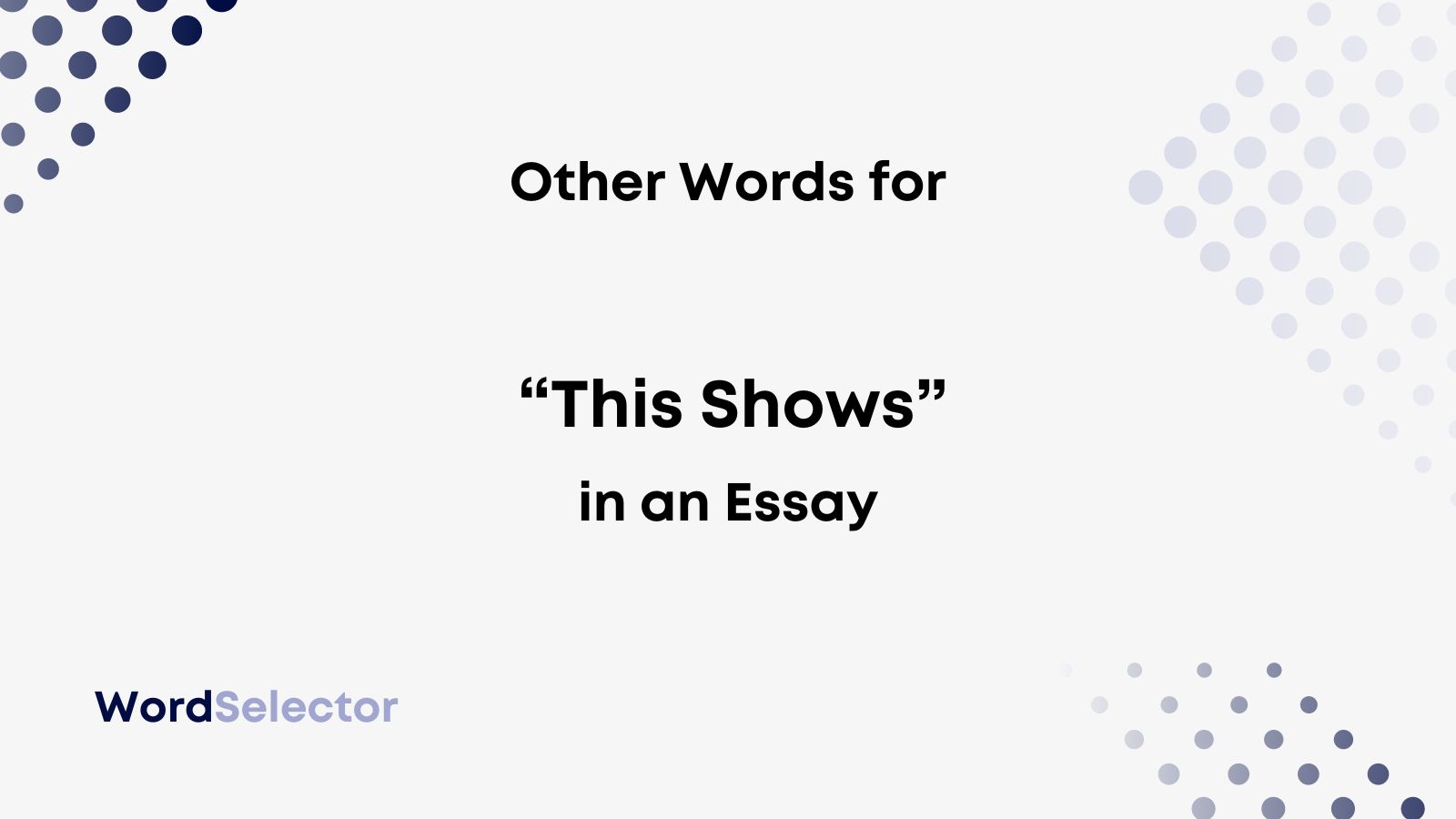
Are you worried about including “this shows” again and again in an essay?
After all, the last thing you want to do is sound repetitive and boring.
Fret not! You have found yourself in the right place.
This article will explore other ways to say “this shows” in an essay.
Other Ways to Say “This Shows”
- This demonstrates
- This indicates
- This implies
- This portrays
- This illustrates
- This establishes
- This proves
- This points to
- This highlights
KEY TAKEAWAYS
- “This shows” is a common phrase used in essays to demonstrate how one thing leads to another.
- “This demonstrates” is a great formal synonym that’ll help to spice up your academic writing.
- Try “suggesting” as an alternative that shows how one thing could have created another.
Keep reading to learn different ways to say “this shows.” We’ve covered the two best phrases to help you understand more about how you can improve your essays.
Alternatively, you can read the final section to learn whether it’s correct to write “this shows.” It’s appropriate to check this out before continuing to include it in your essay!
This Demonstrates
If you’re looking for words to use instead of “this shows” in an essay, try “this demonstrates.” It’s a great formal synonym that’ll help to spice things up.
It also comes with two options. You can use it at the start of a sentence as written:
This is option one. This demonstrates how to continue a thought from the previous sentence.
Or, you can include it as part of the same sentence. To do this, you should switch “this demonstrates” to “demonstrating.” For example:
This is option two, demonstrating that it’s part of the same sentence.
Either way, both are correct. The same applies to “this shows,” where you can use “showing” to include it in the same sentence.
It’s a great way to help the reader follow your process . This should make your essay much easier to read, even if the reader isn’t all that familiar with the topic.
You can also refer to these essay samples:
As you can see, we have also gathered all the necessary data. This demonstrates that we were correct about our original hypothesis.
They have created different rules for what we know. This demonstrates that they’re worried someone might try to interfere with them.
Also, you can write “suggesting” instead of “this shows.” It’s another great professional synonym that’ll help you to keep your writing interesting.
As we’ve already stated, you can use “suggesting” as part of the same sentence:
This is how it works, suggesting you can keep it to one sentence.
Or, you can switch it to “this suggests” to start a new sentence. For instance:
This is how it works. This suggests that you can create two sentences.
Both are correct. They also allow you to switch between them, giving you two options to help mix up your writing and keep the reader engaged .
Here are some essay examples if you still need help:
We have many new ideas ready to go, suggesting that we’re on the road to success. We just need more time.
This is the only way to complete the task, suggesting that things aren’t going to be as easy as we first thought.
Is It Correct to Say “This Shows”?
It is correct to say “this shows.” It’s a great word to use in an essay, and we highly recommend it when you’d like to show how one thing leads to another.
It’s a formal option, which is why it works so well in academic writing.
Also, it allows the reader to follow your thought process, which helps keep things streamlined and clear.
For instance:
Here is an example of how we can achieve this. This shows that we have considered every option so far.
“This shows” always starts a new sentence . You can use it whenever you’d like to connect back to the former sentence directly.
Also, makes sure you use “shows” as the verb form. It comes after “this,” so the only correct form is “shows.” To remind you, you can refer to these examples:
- Correct: This shows that things are supposed to work this way.
- Incorrect: This show that we know what we’re doing.
It’s worth using some extensions if you’re still looking to mix things up as well. Try any of the following:
- This evidence shows
- This picture shows
- This data shows
- This graph shows
- This study shows
Including something between “this” and “shows” allows you to be more specific . It helps direct the reader’s attention to something from the previous sentence.
- 11 Other Ways to Say “Thank You for Your Time”
- 14 Other Words for “Said” in an Essay
- 19 Gender-Neutral Alternatives to “Dear Sir or Madam”
- 15 Other Ways to Say “If I Can Be of Further Assistance”
We are a team of experienced communication specialists.
Our mission is to help you choose the right phrase or word for your emails and texts.
Choosing the right words shouldn't be your limitation!
© WordSelector

10 Other Words for “This Shows” in an Essay
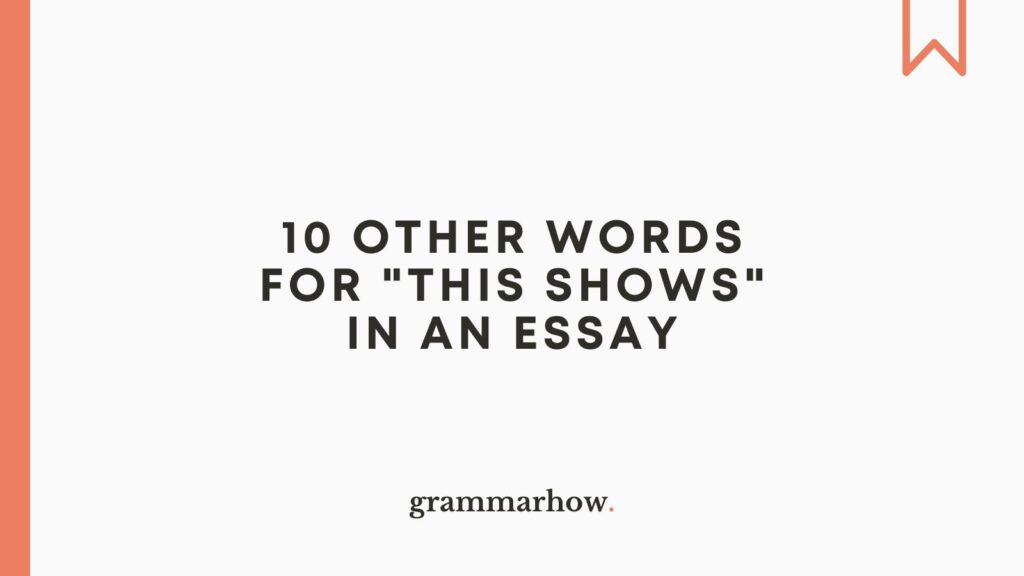
Showing how one thing affects another is great in academic writing. It shows that you’ve connected two points with each other, making sure the reader follows along.
However, is “this shows” the only appropriate choice when linking two ideas?
We have gathered some helpful synonyms teaching you other ways to say “this shows” in an essay.
- Demonstrating
- This implies
- This allows
- This displays
Keep reading to learn more words to replace “this shows” in an essay. You can also review the examples we provide under each heading.
Removing “this” from “this shows” creates a simple formal synonym to mix up your writing. You can instead write “showing” in academic writing to demonstrate an effect .
Typically, this is a great way to limit your word count . Sure, you’re only removing one word from your essay, but if you can find other areas to do something similar, you’ll be more efficient .
Efficient essays often make for the most interesting ones. They also make it much easier for the reader to follow, and the reviewer will usually be able to give you a more appropriate grade.
Check out these examples if you still need help:
- The facts state most of the information here, showing that we still have a lot of work to do before moving forward.
- This is the only way to complete the project, showing that things aren’t quite ready to progress.
2. Demonstrating
Following a similar idea to using “showing,” you can also use “demonstrating.” This comes from the idea that “this demonstrates” is a bit redundant. So, you can remove “this.”
Again, demonstrating ideas is a great way to engage the reader . You can use it in the middle of a sentence to explain how two things affect each other.
You can also review the following examples:
- These are the leading causes, demonstrating the fundamental ways to get through it. Which do you think is worth pursuing?
- I would like to direct your attention to this poll, demonstrating the do’s and don’ts for tasks like this one.
3. Leading To
There are plenty of ways to talk about different causes and effects in your writing. A good choice to include in the middle of a sentence is “leading to.”
When something “leads to” something else, it is a direct cause . Therefore, it’s worth including “leading to” in an essay when making relevant connections in your text.
Here are some examples to help you understand it:
- This is what we are looking to achieve, leading to huge capital gains for everyone associated with it.
- I would like to direct your attention to this assignment, leading to what could be huge changes in the status quo.
4. Creating
Often, you can create cause-and-effect relationships in your writing by including two similar ideas. Therefore, it’s worth including “creating” to demonstrate a connection to the reader.
Including “creating” in the middle of a sentence allows you to clarify certain causes . This helps to streamline your academic writing and ensures the reader knows what you’re talking about.
Perhaps these essay samples will also help you:
- We could not complete the task quickly, creating a problem when it came to the next part of the movement.
- I thought about the ideas, creating the process that we know today. I’m glad I took the time to work through it.
5. This Implies
For a more formal way to say “this shows,” try “this implies.” Of course, it doesn’t change much from the original phrase, but that doesn’t mean it’s ineffective.
In fact, using “this implies” (or “implying” for streamlining) allows you to discuss implications and facts from the previous sentence.
You will often start a sentence with “this implies.” It shows you have relevant and useful information to discuss with the reader.
However, it only works when starting a sentence. You cannot use it to start a new paragraph as it does not relate to anything. “This implies” must always relate to something mentioned before.
You can also review these examples:
- I appreciate everything that they did for us. This implies they’re willing to work together on other projects.
- You can’t always get these things right. This implies we still have a lot of work to do before we can finalize anything.
“Proving” is a word you can use instead of “this shows” in an essay. It comes from “this proves,” showing how something creates another situation .
Proof is often the most important in scientific studies and arguments. Therefore, it’s very common to use “proving” instead of “this shows” in scientific essays and writing.
We recommend using this when discussing your experiments and explaining how it might cause something specific to happen. It helps the reader follow your ideas on the page.
Perhaps the following examples will also help you:
- They provided us with multiple variables, proving that we weren’t the only ones working on the experiment.
- I could not figure out the way forward, proving that it came down to a choice. I didn’t know the best course of action.
7. This Allows
Often, when you talk about a cause in your essays, it allows an effect to take place. You can talk more about this relationship with a phrase like “this allows.”
At the start of a sentence , “this allows” is a great way to describe a cause-and-effect relationship . It keeps the reader engaged and ensures they know what you’re talking about.
Also, using “this allows” directly after expressing your views explains the purpose of your writing. This could show a reader why you’ve even decided to write the essay in the first place.
- Many scenarios work here. This allows us to explore different situations to see which works best.
- I found the best way to address the situation. This allows me to provide more ideas to upper management.
8. This Displays
It might not be as common, but “this displays” is still a great choice in academic writing. You can use it when discussing how one thing leads to another .
Usually, “this displays” works best when discussing data points or figures . It’s a great way to show how you can display your information within your writing to make things easy for the reader .
You can refer to these examples if you’re still unsure:
- We have not considered every outcome. This displays a lack of planning and poor judgment regarding the team.
- I’m afraid this is the only way we can continue it. This displays a problem for most of the senior shareholders.
9. Indicating
Indicating how things connect to each other helps readers to pay attention. The clearer your connections, the better your essay will be.
Therefore, it’s worth including “indicating” in the middle of a sentence . It shows you two points relate to each other .
Often, this allows you to talk about specific effects. It’s a great way to explain the purpose of a paragraph (or the essay as a whole, depending on the context).
If you’re still stuck, review these examples:
- There are plenty of great alternatives to use, indicating that you don’t have to be so close-minded about the process.
- I have compiled a list of information to help you, indicating the plethora of ways you can complete it.
10. Suggesting
Finally, “suggesting” is a word you can use instead of “this shows” in an essay. It’s quite formal and works well in academic writing.
We highly recommend using it when creating a suggestion from a previous sentence . It allows the reader to follow along and see how one thing affects another.
Also, it’s not particularly common in essays. Therefore, it’s a great choice to mix things up and keep things a little more interesting.
Here are a few essay samples to help you with it:
- You could have done it in many other ways, suggesting that there was always a better outcome than the one you got.
- I didn’t know what to think of it, suggesting that I was tempted by the offer. I’m still weighing up the options.

Martin holds a Master’s degree in Finance and International Business. He has six years of experience in professional communication with clients, executives, and colleagues. Furthermore, he has teaching experience from Aarhus University. Martin has been featured as an expert in communication and teaching on Forbes and Shopify. Read more about Martin here .
- 10 Better Ways To Write “In This Essay, I Will…”
- 10 Other Ways to Say “I Am” in an Essay
- 11 Formal Synonyms for “As a Result”
- 10 Other Words for “Said” in an Essay

9 Formal Synonyms for “This Shows”
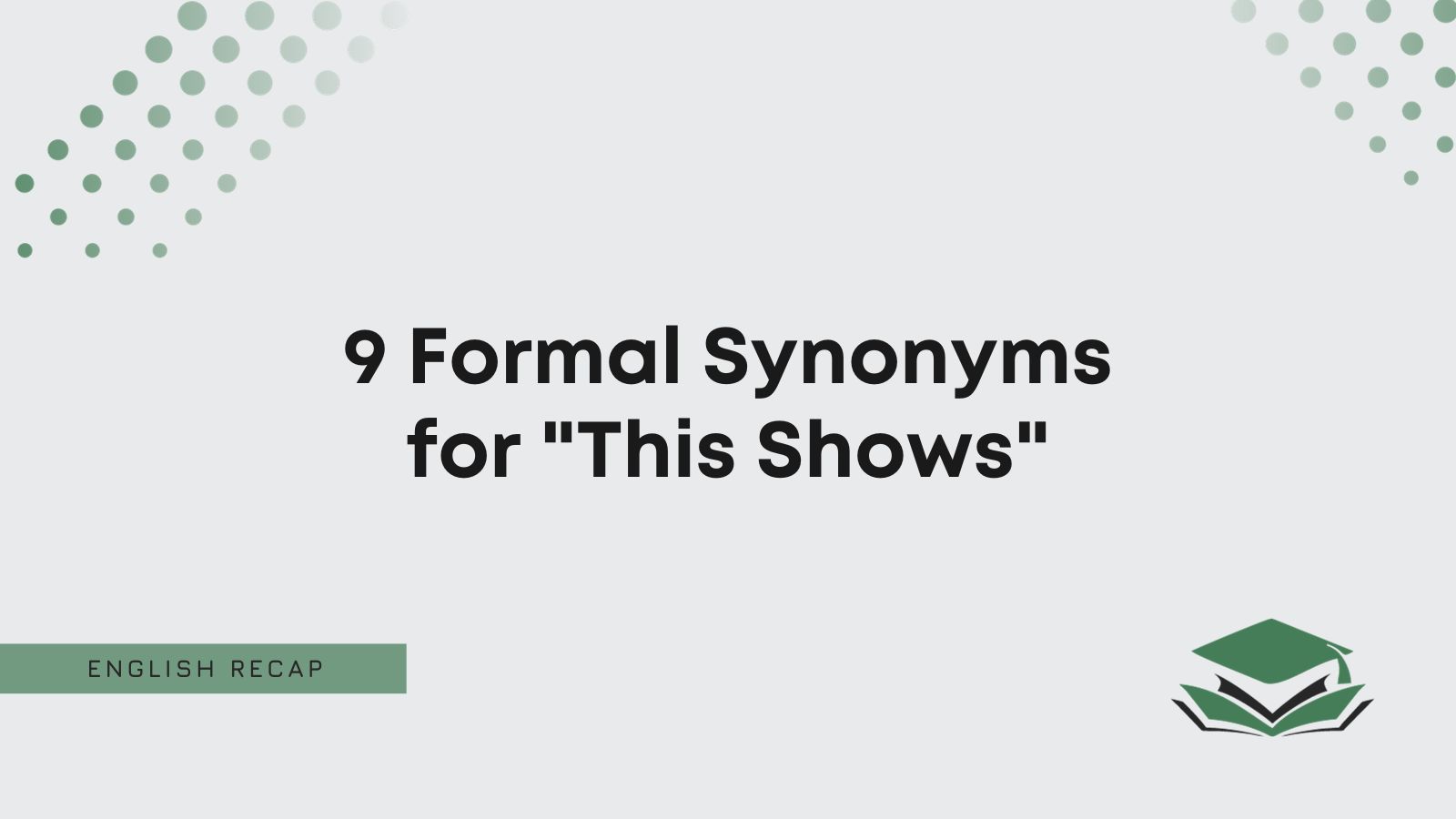
Do you want to discuss how one sentence confirms a thought or idea in another sentence?
Perhaps you’re worried that “this shows” doesn’t work too well in an essay because it’s informal or rude.
Well, you’re in luck!
This article will teach you other ways to say “this shows” to keep your writing interesting.
Is It Formal to Say “This Shows”?
It is formal to say “this shows.” You can use it in academic writing because it helps you to confirm how one sentence relates to another.
It’s also professional . Therefore, it’s always a good choice in essays.
However, you should be careful using it too much. Oversaturating your essays with “this shows” can take away from their impact and cause your essay to sound repetitive and boring.
Feel free to review this example to learn a bit more about it:
It’s clear that this is the best way forward. This shows that no other solution was reasonable to consider.
- It’s formal and direct.
- Readers will understand that you’re relating your sentence back to a previous one.
- It can very quickly become repetitive and boring.
- It’s not the most imaginative phrase to use to link sentences.
So, it’s clear that “this shows” works well in your writing. But that doesn’t mean you should limit yourself to using it as your only option.
Keep reading to learn other words for “this shows” in an essay. We’ve touched on some of the best synonyms to give you a better idea of what will work.
What to Say Instead of “This Shows”
- This demonstrates
- This illustrates
- This signifies
- This indicates
- This confirms
- This conveys
1. This Demonstrates
We recommend starting with “this demonstrates” to show you’re talking about something from the previous sentence.
It’s a great way to keep things formal and informative . Therefore, you can use it when filling out an essay or completing a passage of text that might benefit from linked sentences.
For the most part, if you can demonstrate how one thing leads to another, it’s good writing. After all, it’ll help readers to understand what you’re saying and how to make connections in your work.
You can refer to these essay samples to learn a bit more about it:
It’s clear what needs to be done. This demonstrates the resolve required to complete a task like this one.
We only had one option. This demonstrates that every other possible outcome has been expended and made impossible to continue.
2. This Illustrates
Next, we recommend writing “this illustrates.” It’s another way to say “this shows” that helps you to mix things up and sound less repetitive when you want to.
Generally, it’s a good formal synonym that shows why your previous sentence links to a new one.
It’s an effective way to engage a reader . It’s also professional and direct , so it’ll keep readers involved when they’re going through your essay.
Also, it’s worth reviewing these examples to learn more:
I’ve included all the findings to show you what I mean. This illustrates that there are still a few ways for me to continue with this.
This illustrates how simple it is to make it work. However, it’s going to take a few extra pairs of hands before we can start doing anything more.
Next, we want to mix things up a little bit. Rather than only focusing on academic writing, we also recommend using some of these synonyms in an email.
For instance, “showing” can work really well to link your email to itself.
But how does that work?
Well, you can use “showing” in the middle of a sentence to professionally explain why you’re writing about something.
It’s good to use when contacting a coworker . After all, you can explain your thought process and let them know more about what you’re thinking and what it “shows.”
Also, “this shows” and “showing” are nearly identical in usage. However, you must never forget you can’t start a sentence with “showing.” It must be placed in the middle of a sentence.
If you’re still unsure, perhaps this email sample will help you:
Dear Michael, I’m going to do it like this, showing that it’s still possible to complete the tasks without them. Please advise me on what you think is the best way to move forward. Yours, Brian Renshaw
4. This Signifies
Back to essays, we recommend writing “this signifies” as well. It teaches you how to say “this shows” in an essay when you’re trying to mix things up.
For the most part, this keeps things professional and clear . Therefore, it’s a great way to explain how things work or connect with each other.
Readers and reviewers will certainly appreciate including phrases like this.
That’s why we recommend using it in academic writing, as it’s bound to impress your professor if you want to.
After all, if they’re grading your work, it’s good to show that you know what you’re talking about.
As always, try not to repeat it too much! It can very easily make your essay sound repetitive if you’re not careful, which is never a good idea.
Also, you can check out these examples to learn a bit more:
As you can see, there are a few errors to discuss. This signifies that things still need to change before we can keep moving forward.
This signifies what could happen if things are left unattended. That’s why it’s important for us to break through quickly.
5. This Indicates
If you’re still unsure how to say “this shows” in an essay, try using “this indicates.”
It’s a great synonym that teaches you more about the things that work well in your writing.
After all, the more you explore your alternatives, the better your work will look. The last thing you want to do with your essays is make them repetitive and samey.
Readers will engage more when using phrases like this.
Here are some examples to also help you with it:
This indicates everything I’m trying to discuss with you. I think it’s important for you to pay attention to what’s to come.
It’s clear what I have to do. This indicates that only one option is going to work in our favor, so we must be prepared.
6. Implying
Next, we recommend writing “implying” instead of “this shows.” Again, this is a good one to use in the middle of a sentence .
So, we recommend writing it when explaining how one situation leads to another in the same string of text.
It’s good in academic writing as it’s quite professional and clear .
You can review these examples to see more about how to use it:
The statistics have made the situation more clear, implying that we need to make drastic changes quickly.
This is how it will work, implying that someone is going to need to step up to ensure things go that way.
7. Suggesting
Another good choice in academic essays is “suggesting.” This works in the middle of a sentence by showing how one idea suggests that another can happen.
You can use it to keep the reader informed as you go through an essay.
The more links you make within your sentences, the more your essay will make sense to the people reading or grading it.
That’s why we like this as an option in most graded essays. However, you should still try to limit how often you use something like this.
Check out these examples to find out more about how it works:
I have looked into it and found nothing important, suggesting that this isn’t the right place to go.
It’s clear what we need to do next, suggesting that there are some options we have yet to explore.
8. This Confirms
Going back to an email alternative, we recommend trying “this confirms.”
It’s a great way to confirm or suggest information to the recipient. It also creates a clear and direct link between the two things you’ve mentioned in an email.
So, you can use it when writing to coworkers . It shows you’ve looked into a collaborative effort and noticed that one thing confirms another.
Here’s a helpful sample email to show you more about how to use it:
Dear Steven, I looked into the project we’ve got so far, but we need to make some changes. This confirms that Alice did not look at the notes properly. Best regards, Sean Bryce
9. This Conveys
Finally, you can use “this conveys” in your formal essays . It’s a good way to entice the reader and let them know you’re in control of your own narrative.
It’s a good way to convey or confirm information quickly.
It gets to the point and shows you’re happy to explain yourself further if someone still isn’t getting what you’re saying.
Here are some helpful samples to show you a bit more about it:
As you can see, the results are a bit skewed. This conveys that we have to work harder to narrow the gap.
This conveys exactly what we thought would happen. Therefore, more works needs to be done to improve.
- 10 Professional Ways to Say “Get Well Soon”
- How to Address Multiple Doctors (All Situations)
- 9 Ways to Say “Please Take Your Time” in a Formal Email
- 9 Polite Ways to Say “Well Noted” in an Email
We are a team of dedicated English teachers.
Our mission is to help you create a professional impression toward colleagues, clients, and executives.
© EnglishRecap

12 Other Words for “This Shows” in an Essay
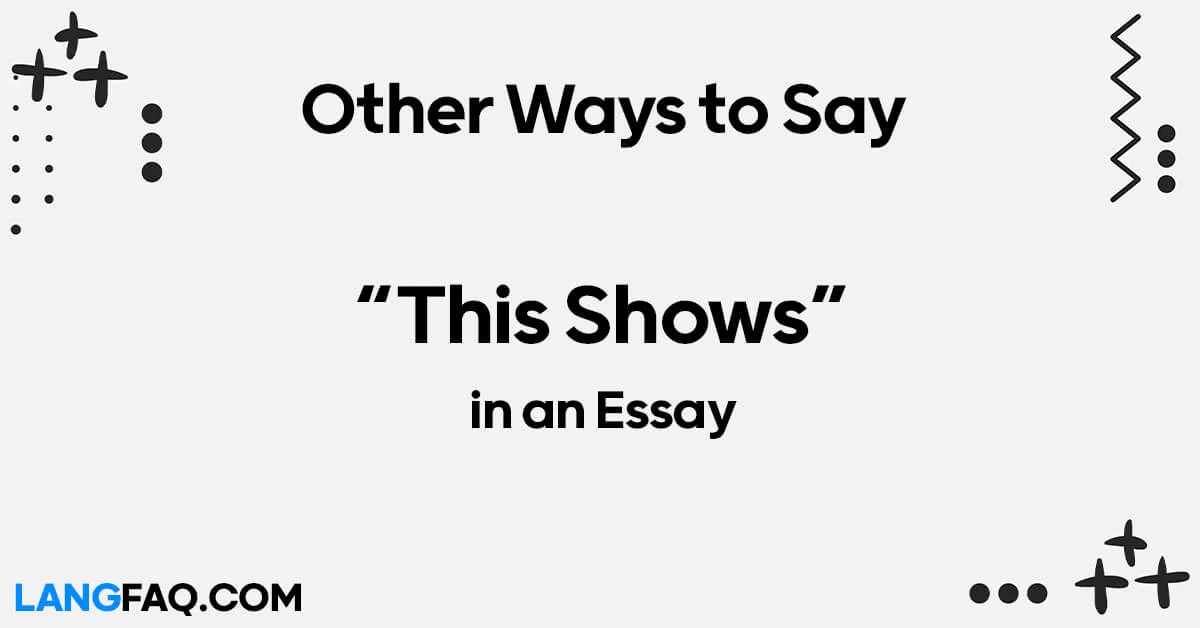
Share this post:
Embarking on the journey of expressive writing requires the adept use of language . Unveiling alternative phrases for “This Shows” can transform your essays into compelling narratives. In this article, we delve into 12 distinctive expressions, enhancing your ability to articulate thoughts with finesse. Let’s embark on this linguistic exploration.
12 Other Words for “This Shows”
Here are 12 alternative expressions for “This Shows”:
- Demonstrates
- Illustrates
- Exemplifies
Here’s a table with meanings and examples for the 12 alternative expressions for “This Shows”:
These alternative expressions provide a rich tapestry of language to convey ideas effectively in writing. By diversifying your vocabulary, you can add nuance and depth to your communication, ensuring that your message resonates with clarity and impact.
Is It Correct to Say “This Shows”?
Certainly, using the phrase “This shows” is grammatically correct, and it’s a commonly employed expression in writing and speaking. However, to enhance the variety and sophistication of your language, you might consider incorporating alternative expressions for greater impact.
The phrase “This shows” is straightforward and direct, making it suitable for various contexts, from academic writing to everyday communication. It efficiently conveys the idea that something is being demonstrated or revealed. For example:
- “The data analysis is thorough, and this shows the researcher’s attention to detail.”
- “She consistently meets deadlines, and this shows her commitment to the project.”
While grammatically correct, it’s beneficial to diversify your vocabulary to prevent repetition and add nuance to your expression. Utilizing alternatives such as “demonstrates,” “illustrates,” “reveals,” or any of the other suggested terms in this article can elevate the quality of your writing, providing a more varied and sophisticated linguistic palette.
Professional Mail Example With “This Shows”
Subject: Project Progress Update – Milestone Achieved
Dear [Recipient’s Name],
I trust this email finds you well. I am writing to provide you with an update on the current status of the project.
We have successfully completed the initial phase of the project, and I am pleased to inform you that our team’s collective efforts have borne fruit. This shows the dedication and commitment we have invested in ensuring the project’s success .
To delve into specifics, the data analysis, as outlined in our project plan, has been meticulously executed. The comprehensive report generated from this analysis not only meets but exceeds the expected standards. This shows our attention to detail and commitment to delivering quality outcomes.
Moreover, our collaborative approach with the cross-functional teams has significantly contributed to the seamless progression of tasks. This shows the effectiveness of our teamwork and the positive impact it has on project timelines.
In the coming weeks, we are poised to enter the next phase, building upon the solid foundation laid during this initial stage. We are confident that the momentum we’ve gained will propel us toward meeting and even surpassing our project objectives.
I welcome any feedback or suggestions you may have as we proceed. Your insights are invaluable to us, and we are committed to ensuring the project aligns with your expectations.
Thank you for your continued support and trust in our team’s capabilities. We look forward to achieving further milestones together.
Best regards,
[Your Full Name] [Your Position] [Your Contact Information]
1. Evidently: A Clear Path to Clarity
“Evidently” is an adverb used to convey a clear and unmistakable indication of a situation or fact.
In formal writing, “evidently” can enhance the expression of certainties or observations without leaving room for doubt. In informal contexts, it adds a touch of confidence to casual conversations.
Formal: The research data EVIDENTLY supports the hypothesis, showcasing a significant correlation between variables.
Informal: EVIDENTLY, she has a talent for turning challenges into opportunities.
Email Sample:
Subject: Evidently Successful Project Results
Dear [Recipient],
I hope this message finds you well. I am pleased to inform you that our recent project has EVIDENTLY exceeded expectations. Attached is a detailed report for your review.
Best regards, [Your Name]
- Formal Variation: It is EVIDENT FROM THE ANALYSIS that our strategy is effective.
- Informal Variation: EVIDENTLY, you aced that presentation!
Using “evidently” brings an air of authority to your statements, making it suitable for professional communication where clarity is paramount.
2. Demonstrates: Showcasing Excellence
“Demonstrates” is a verb indicating a clear and conclusive presentation of a concept, skill, or fact.
In formal writing, “demonstrates” is powerful for illustrating achievements or capabilities. In casual settings, it can highlight personal skills or achievements.
Formal: The experiment DEMONSTRATES the effectiveness of the proposed solution.
Informal: He DEMONSTRATES exceptional leadership in every project.
Subject: Demonstrates Strong Leadership
I wanted to bring to your attention how [Name] consistently DEMONSTRATES exceptional leadership skills in our team. His recent contributions have been noteworthy.
- Formal Variation: The report DEMONSTRATES the company’s commitment to sustainability.
- Informal Variation: She DEMONSTRATES creativity in every design.
“Demonstrates” adds weight to your assertions, making it ideal for showcasing accomplishments in professional and personal contexts.
3. Illustrates: Painting Pictures with Words
“Illustrates” is a verb conveying the creation of a clear and vivid picture through words, often used to explain or clarify.
Formally, “illustrates” is potent for elucidating complex concepts. In informal communication, it lends a creative flair to storytelling.
Formal: The graph ILLUSTRATES the correlation between input and output variables.
Informal: Let me ILLUSTRATE my point with a personal anecdote.
Subject: Illustrates Our Progress
The attached report ILLUSTRATES the remarkable progress we’ve made this quarter. Feel free to reach out if you have any questions.
- Formal Variation: The case study ILLUSTRATES the effectiveness of the proposed strategy.
- Informal Variation: His experience ILLUSTRATES the power of resilience.
“Illustrates” is a versatile term, suitable for both technical explanations and adding a storytelling element to your conversations.
4. Reveals: Unveiling Truths
“Reveals” is a verb indicating the disclosure or exposure of something previously hidden or unknown.
In formal contexts, “reveals” is impactful for unveiling discoveries or insights. Informally, it adds a dramatic touch to everyday storytelling.
Formal: The investigation REVEALS new dimensions in our understanding of the phenomenon.
Informal: Guess what the interview REVEALS about his unconventional career path!
Subject: Reveals Key Findings
The attached document REVEALS key findings from our recent market analysis. Your insights on this matter would be valuable.
- Formal Variation: The research REVEALS a previously unknown correlation.
- Informal Variation: This documentary REVEALS the hidden gems of our city.
“Reveals” adds a touch of intrigue to your narrative, making it suitable for both professional revelations and casual storytelling.
5. Displays: Showcasing for Impact
“Displays” is a verb indicating the presentation or exhibition of something for observation or admiration.
In formal writing, “displays” is apt for showcasing achievements or results. Informally, it adds flair to expressing personal accomplishments.
Formal: The conference room DISPLAYS a collection of awards highlighting our achievements.
Informal: She DISPLAYS a remarkable level of dedication to her craft.
Subject: Displays of Excellence
Our team consistently DISPLAYS excellence in every project. Please find the attached report for your review.
- Formal Variation: The showroom DISPLAYS the latest innovations in technology.
- Informal Variation: He DISPLAYS unmatched passion for his hobbies.
“Displays” emphasizes visibility and impact, making it suitable for professional and personal contexts, especially when showcasing accomplishments.
6. Manifests: Bringing Ideas to Life
“Manifests” is a verb signifying the clear and tangible expression or demonstration of an idea, quality, or feeling.
In formal settings, “manifests” is potent for portraying tangible outcomes. Informally, it adds a touch of vividness to personal narratives.
Formal: His dedication MANIFESTS in the consistent quality of work delivered.
Informal: The team spirit MANIFESTS in our successful collaborations.
Subject: Manifests Exceptional Performance
I wanted to highlight how [Name]’s effort MANIFESTS in the exceptional performance of our recent project. Please find the details attached.
- Formal Variation: The initiative MANIFESTS the organization’s commitment to sustainability.
- Informal Variation: His kindness MANIFESTS in the little things he does for others.
“Manifests” adds a layer of tangibility to your descriptions, making it suitable for both professional and personal contexts, especially when emphasizing dedication or commitment.
7. Portrays: Crafting a Narrative
“Portrays” is a verb conveying the representation or depiction of something through words, images, or actions.
Formally, “portrays” is effective for creating a narrative or analysis. Informally, it adds a storytelling element to personal anecdotes.
Formal: The movie PORTRAYS the harsh realities of urban life.
Informal: Let me PORTRAY a scene from my recent travel adventure.
Subject: Portrays Our Brand Identity
I trust this message finds you well. The attached document PORTRAYS our brand identity and the values we hold dear.
- Formal Variation: The report PORTRAYS the evolving landscape of our industry.
- Informal Variation: His artwork beautifully PORTRAYS the essence of nature.
“Portrays” invites readers to visualize, making it suitable for both analytical writing and creative storytelling.
8. Exemplifies: Setting a Standard
“Exemplifies” is a verb indicating the action of serving as a typical example or illustration of a concept or quality.
In formal writing, “exemplifies” is powerful for setting standards or showcasing ideal scenarios. Informally, it adds a touch of admiration to personal narratives.
Formal: The successful entrepreneur EXEMPLIFIES resilience and adaptability.
Informal: She truly EXEMPLIFIES the meaning of generosity.
Subject: Exemplifies Excellence
I am delighted to share how [Name] consistently EXEMPLIFIES excellence in their role. Please find the details attached.
- Formal Variation: The project EXEMPLIFIES the organization’s commitment to innovation.
- Informal Variation: Your dedication EXEMPLIFIES true friendship.
“Exemplifies” adds a layer of admiration to your descriptions, making it suitable for both professional and personal contexts, especially when highlighting exemplary qualities.
9. Conveys: Communicating with Precision
“Conveys” is a verb indicating the clear and effective communication of an idea, feeling, or information.
In formal writing, “conveys” is essential for emphasizing effective communication. Informally, it brings a touch of intention to casual conversations.
Formal: The speaker CONVEYS the urgency of addressing climate change in his presentation.
Informal: She CONVEYS her excitement for the upcoming event through animated gestures.
Subject: Conveys Key Messages
The attached document CONVEYS the key messages from our recent meeting. Your feedback is highly appreciated.
- Formal Variation: The artwork CONVEYS the artist’s commentary on societal issues.
- Informal Variation: His smile CONVEYS a sense of genuine happiness.
“Conveys” adds a layer of intention to your communication, making it suitable for both formal presentations and casual expressions.
10. Signifies: Indicating Importance
“Signifies” is a verb indicating the action of conveying meaning, importance, or intention.
Formally, “signifies” is potent for indicating significance. Informally, it adds depth to expressions of importance or intent.
Formal: The ringing bell SIGNIFIES the end of the school day.
Informal: Their shared laughter SIGNIFIES a strong bond.
Subject: Signifies Milestone Achievement
I am thrilled to share that our recent accomplishment SIGNIFIES a significant milestone for the team. Please find the details attached.
- Formal Variation: The decision SIGNIFIES a strategic shift in our approach.
- Informal Variation: Your support SIGNIFIES a lot to me.
“Signifies” adds gravitas to your descriptions, making it suitable for both formal announcements and personal expressions of importance.
11. Exhibits: Showcasing for Inspection
“Exhibits” is a verb indicating the action of displaying or presenting something for observation or inspection.
In formal contexts, “exhibits” is potent for showcasing achievements or qualities. Informally, it adds flair to expressing personal accomplishments.
Formal: The museum EXHIBITS artifacts from ancient civilizations.
Informal: He always EXHIBITS a positive attitude, no matter the circumstance.
Subject: Exhibits Exceptional Skills
I am pleased to inform you that [Name] consistently EXHIBITS exceptional skills in project management. Please find the details attached.
- Formal Variation: The gallery EXHIBITS a diverse collection of contemporary art.
- Informal Variation: His personality EXHIBITS warmth and kindness.
“Exhibits” emphasizes visibility and impact, making it suitable for professional and personal contexts, especially when showcasing accomplishments.
12. Indicates: Pointing Towards Understanding
“Indicates” is a verb indicating the action of pointing out or showing a particular direction, meaning, or result.
In formal writing, “indicates” is crucial for pointing towards insights or findings. Informally, it adds a touch of direction to casual conversations.
Formal: The compass INDICATES the way to the north.
Informal: His expression INDICATES genuine interest in the topic.
Subject: Indicates Project Progress
The attached report INDICATES significant progress in our ongoing project. Your thoughts on this matter would be valuable.
- Formal Variation: The data INDICATES a positive trend in customer satisfaction.
- Informal Variation: Your gesture INDICATES a caring attitude.
“Indicates” adds precision to your descriptions, making it suitable for both formal reports and casual expressions of direction.
Q: How can I seamlessly incorporate these alternatives into my essay? A: Integrate these alternatives based on the context of your writing. Experiment with each to discover which resonates best with your style.
Q: Is it necessary to use all 12 alternatives in one essay? A: No, select alternatives based on relevance and variety. Using a mix adds depth to your writing without overwhelming the reader.
Q: Can these alternatives be applied to any type of essay? A: Absolutely! Whether it’s a persuasive piece or an informative essay, these alternatives enhance expression in various contexts.
Q: Why is expressive writing important in essays? A: Expressive writing captivates readers, making your essay memorable. It adds a personal touch, fostering a connection between the writer and the audience.
Q: Are these alternatives suitable for academic essays? A: Yes, these alternatives elevate the quality of academic writing, making your essays more engaging and impactful.
Q: How do I avoid overusing these alternatives in my essay? A: Use a mix of alternatives and vary your language to maintain a natural flow. Overusing any term can diminish its impact.
Mastering alternative expressions for “This Shows” is a transformative step in refining your essay-writing skills. The nuances offered by these alternatives open new avenues for expression, ensuring your essays stand out with clarity and impact.
Similar Posts
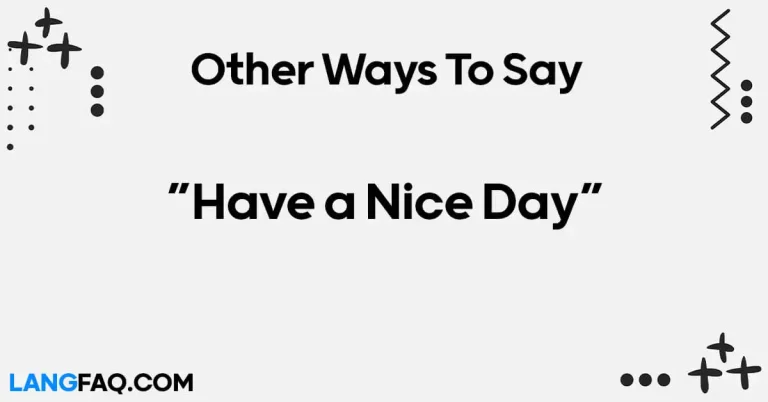
12 Other Ways to Say “Have a Nice Day”
Share this post: Facebook X Pinterest Embracing positivity in our daily lives goes beyond the ordinary “Have a Nice Day.” In this comprehensive guide, we explore 12 alternative…
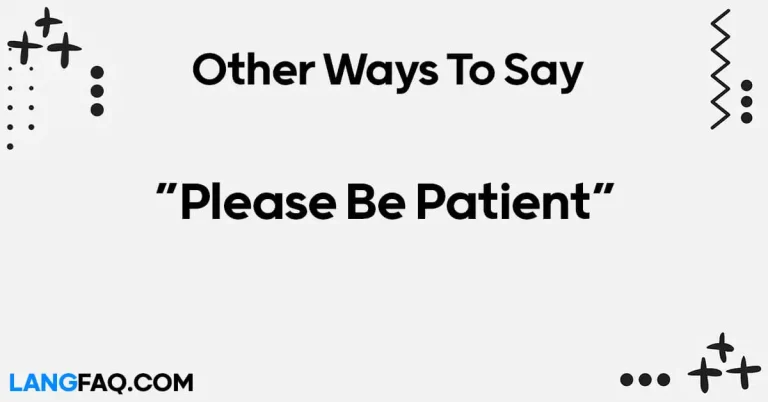
12 Other Ways to Say “Please Be Patient”
Patience is a virtue, and effective communication plays a pivotal role in expressing it. In this comprehensive guide, we delve into 12 alternative ways to say “Please Be…
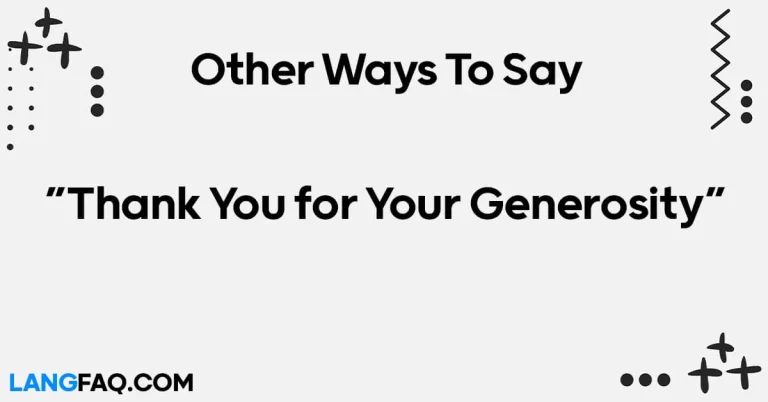
12 Other Ways to Say “Thank You for Your Generosity”
Expressing gratitude is an art, and there are numerous ways to convey heartfelt thanks. In this guide, we’ll delve into 12 other ways to say “Thank You for…
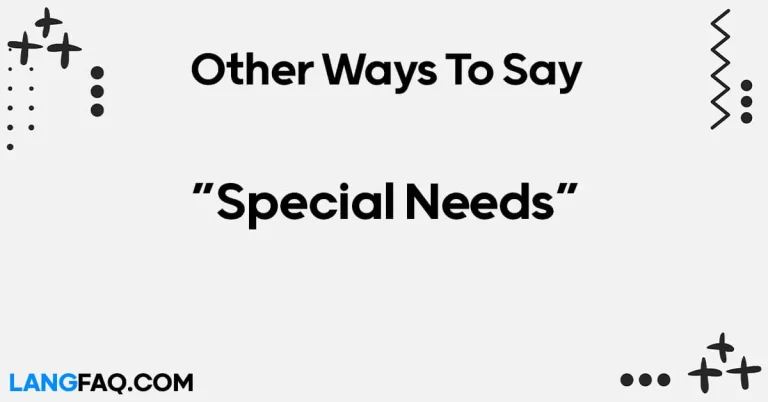
12 Other Ways to Say “Special Needs”
Welcome to a journey of linguistic diversity and inclusivity! This article explores various ways to convey the concept of “Special Needs” in different contexts. From educational settings to…
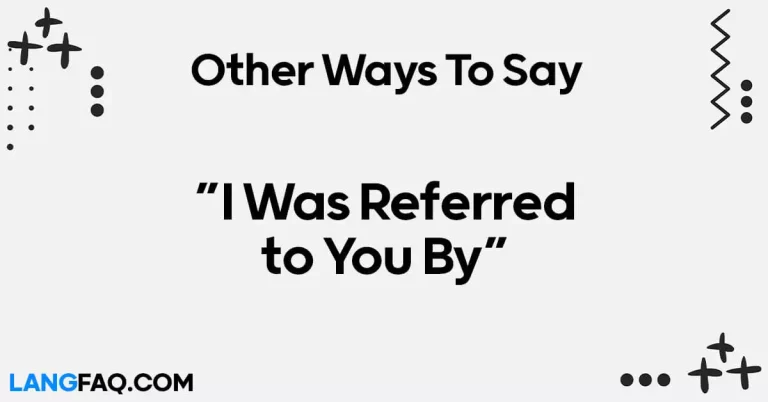
12 Ways to Say “I Was Referred to You By”
In a professional setting, having a referral can significantly increase your chances of getting noticed and securing an opportunity. It shows that you have a mutual connection and…
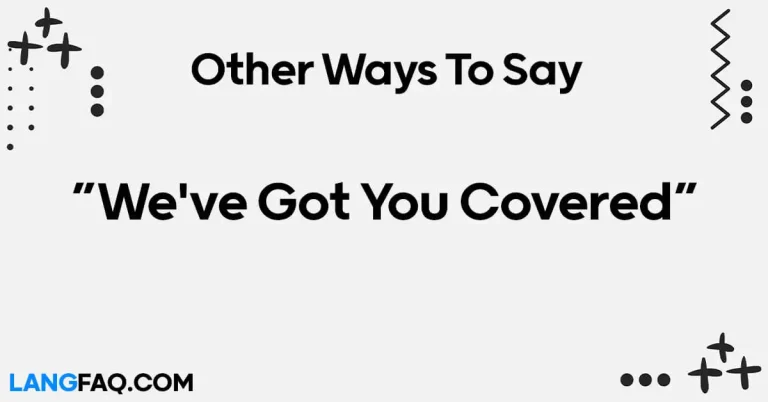
10 Other Ways to Say “This Shows”

When writing or speaking, there are times when you want to emphasize something or draw attention to evidence . The phrase “this shows” is commonly used in such contexts. However, just as we have many ways to convey good wishes, there are other ways to say “it shows” in English. Varying your vocabulary can make your arguments more persuasive and your writing more engaging.
Table of Contents

Other Ways to Say “This Shows”
By expanding your vocabulary, you can articulate your thoughts more precisely and convincingly. Instead of using “this shows” repeatedly, consider the following alternatives:
- This Indicates
Example: “The rising temperatures indicate a change in the climate.”
Meaning: “Indicate” is a formal way of suggesting that something serves as a sign or a clear pointer to a certain fact or situation. It’s like a beacon highlighting specific information.
Usage: When presenting research findings, the term “indicate” can be used to point out correlations or trends observed in the data.
- This Demonstrates
Example: “The consistently high grades of the student demonstrate his dedication to his studies.”
Meaning: “Demonstrate” conveys the idea that something stands as tangible proof or clear evidence of a particular fact or quality, showcasing it in action.
Usage: In academic discussions, “demonstrate” is often used to present findings or theories that are supported by concrete evidence.
- This Reveals
Example: “The diary entries reveal the author’s innermost thoughts and fears.”
Meaning: “Reveal” is akin to pulling back a curtain on something, making known or uncovering details, facts, or sentiments that were previously concealed or not immediately apparent.
Usage: Mystery writers often use “reveal” when unveiling a critical plot twist or a character’s secret.
- This Suggests
Example: “The presence of ancient artifacts in this area suggests that a civilization once thrived here.”
Meaning: “Suggest” is a subtle way of hinting at something, implying or hinting at a fact or idea without making a direct or overt statement.
Usage: In speculative discussions or when making educated guesses, “suggest” is a preferred term to indicate possible scenarios.
- This Highlights
Example: “The documentary highlights the challenges faced by refugees.”
Meaning: “Highlight” is like shining a spotlight on something, drawing special attention to or emphasizing a particular point, detail, or aspect, making it stand out.
Usage: Journalists and documentarians use “highlight” when they want to focus on specific issues or stories that need more public attention.
- This Reflects
Example: “The company’s values reflect its commitment to sustainability.”
Meaning: “Reflect” conveys the idea that something serves as a mirror image or a clear representation of a particular quality, sentiment, or fact, showcasing its essence.
Usage: In discussions about values, principles, or culture, “reflect” is used to show alignment or representation.
- This Illustrates
Example: “Her story illustrates the hardships faced by many immigrants.”
Meaning: “Illustrate” is akin to painting a picture with words, serving as a vivid example or clarification of a point, making abstract ideas more tangible.
Usage: Educators and trainers often use “illustrate” when providing examples to explain complex concepts.

- This Confirms
Example: “The DNA test confirms the suspect’s presence at the crime scene.”
Meaning: “Confirm” is a stamp of validation, establishing the truth, accuracy, or correctness of something without a shadow of a doubt.
Usage: In legal or scientific contexts, “confirm” is used when evidence solidly supports a claim or hypothesis.
- This Points To
Example: “The data points to a significant increase in sales next quarter.”
Meaning: “Points to” is like a compass directing attention or focus towards a particular conclusion, fact, or outcome, guiding the narrative.
Usage: Analysts and forecasters use “points to” when discussing trends or predictions based on current data.
- This Underscores
Example: “The recent events underscore the importance of preparedness.”
Meaning: “Underscore” is like underlining a written word, emphasizing or giving added force to a point, ensuring it’s not overlooked.
Usage: Speakers and writers use “underscore” when they want to stress the significance or urgency of a particular point or issue.

Choosing the Right Expression for the Context
The context in which you speak or write plays a key role in choosing an expression. It’s not just about what you say, but how you say it. The right choice of words can improve the impact of your message by making it more resonant and memorable for your audience.
Formal Writing :
In environments that demand precision and clarity, such as research papers, official documents, or business communications, it’s crucial to use terms that convey authority and specificity. Expressions like “validates,” “corroborates,” and “signifies” not only sound professional but also add weight to the statements, ensuring that the audience understands the gravity of the information being presented.
Casual Conversations :
When you’re engaged in daily dialogues, be it with friends, family, or acquaintances, the tone is often more relaxed and personal. In such settings, it’s more about connection than precision. Using expressions like “depicts” or “conveys” can make the conversation flow more naturally, allowing for a more genuine exchange of thoughts and feelings.
Artistic Endeavors :
The realm of art and creativity thrives on emotion, imagination, and nuance. Whether you’re penning a poem, crafting a story, or delivering a theatrical performance, the words you choose can paint vivid images in the minds of your audience. Expressions like “exemplifies” or “accentuates” can add layers of depth and texture to your narrative, allowing your audience to delve deeper into the world you’re creating.
In conclusion, the power of language lies not only in the words we choose but also in the context in which we use them. By considering our audience and setting, we can choose expressions that resonate more deeply, amplifying the impact of our message. Whether in formal discourse, casual chats, or artistic creations, adapting our language elevates our communication.
As we continue to explore and expand our language repertoire, we enrich not only our own expression but also the experience of those we interact with. For those who want to dive deeper into the nuances of language and its impact, the Oxford English Dictionary offers a treasure trove of insights. Remember, it’s not just about saying something, it’s about making it really meaningful.
1. Why is “this shows” such a commonly used expression in English?
“This shows” is a straightforward and clear way to introduce evidence or illustrate a point. Its simplicity makes it a popular choice in both spoken and written English to connect an observation with its implication.
2. In what contexts is “this shows” most appropriately used?
While versatile, “this shows” is most commonly found in analytical writing , such as essays, reports, and research papers . It’s used to introduce evidence or examples that support a preceding statement or argument.
3. Can “this shows” be overused in writing or speech?
Yes, like any phrase, over-reliance on “this shows” can make writing sound repetitive. It’s beneficial to diversify expressions to maintain reader engagement and convey depth of thought.
4. Are there situations where “this shows” might not be the best choice? In very formal or technical writing, more specific phrases might be preferred to convey precise relationships between data or observations. Additionally, in casual conversations, more relaxed expressions might be more fitting.
5. Is “this shows” understood universally in English-speaking cultures? Generally, yes. “This shows” is a standard expression in English and is widely understood across English-speaking cultures. However, the nuances of what follows might vary based on cultural contexts.
6. Can the overuse of “this shows” impact the quality of my writing?
While the expression itself is neutral, overusing any phrase can make writing seem monotonous. For quality writing, it’s essential to have a mix of expressions that fit the context and effectively convey the intended message.
Related Posts:
- 17 Other Ways to Say “Thank You for Your Interest”
- 18 Other Ways to Say “Thank You for Your Patience…
- 16 Other Ways to Say "I Would Love To"
- 50 Creative Ways to Say Thank You on Social Media
- 12 Other Ways to Say "You Can Do It"
- 16 Other Ways to Say "Hope to See You Soon"
Leave a comment Cancel reply
Your email address will not be published. Required fields are marked *
Save my name, email, and website in this browser for the next time I comment.
11 Formal Synonyms for “This Shows”
Alex Carter
Understanding the nuances of language can significantly enhance the clarity and professionalism of our communication. In the realm of written and spoken English, the phrase “this shows” is commonly used to present evidence or illustrate a point. However, relying too heavily on this phrase can make our language seem repetitive or overly simplistic, especially in formal or academic contexts.
The Importance of Expanding Your Vocabulary
Expanding our vocabulary, particularly with formal synonyms for common phrases like “this shows,” can greatly improve our expressiveness and the persuasiveness of our arguments. Formal synonyms allow us to tailor our language to suit the context more accurately, enhancing the perceived sophistication and credibility of our communication. In formal writing or speaking, such as academic papers, business reports, or professional presentations, the ability to use varied and precise language is highly valued.
Utilizing a broad array of synonyms not only avoids the monotony of repetition but also clarifies the strength or nature of the connection being made. For example, some synonyms may imply causation, while others might suggest correlation, providing subtle but important distinctions. The benefits of diversifying our language include improved reader engagement, clearer articulation of complex ideas, and a stronger, more confident voice in our written and spoken communications.
Examples of Formal Synonyms for “This Shows”
In this section, we provide a comprehensive list of formal synonyms for “this shows,” each accompanied by a scenario-based usage. These examples aim to illustrate the versatility and appropriateness of each synonym in different contexts.
Tips for Using Formal Synonyms Effectively
When incorporating these formal synonyms into your language, it’s important to consider the context and the nuance each synonym conveys. Here are some tips to ensure you use them effectively:
- Understand the subtle differences in meaning among these synonyms. For instance, “this corroborates” implies confirmation through additional evidence, while “this suggests” might indicate a hypothesis based on observed data.
- Consider the audience and purpose of your communication. Academic and professional settings often favor more formal language, but the most appropriate choice of words can vary depending on the specific field or discipline.
Additionally, practicing the following can enhance your proficiency:
- Read extensively in your field to observe how experts use these synonyms in context.
- Experiment with different synonyms in your writing or speaking to find which expressions best convey your intended meaning and resonate with your audience.
Common Mistakes to Avoid
While expanding your vocabulary, be cautious of common pitfalls associated with using formal synonyms:
- Overcomplicating your message by using a synonym that is too obscure or formal for the context can alienate or confuse your audience.
- Misusing synonyms due to misunderstanding their nuances can lead to inaccuracies in your communication. It’s crucial to fully grasp the meaning and usage of a word before incorporating it into your work.
To avoid these mistakes, remember to:
- Keep your language clear and accessible , even when opting for more formal synonyms.
- Always check the definition and usage examples of a new synonym to ensure it fits your intended meaning.
Putting It into Practice: Real-World Examples
Here, we present real-world scenarios where you can appropriately apply these formal synonyms to enhance your communication.
Beyond “This Shows”: Enhancing Your Language for Clarity and Impact
Mastering the use of formal synonyms for common phrases like “this shows” is an ongoing process that requires practice, attention to context, and an understanding of your audience’s expectations. By thoughtfully selecting the most appropriate synonym, you can significantly enhance the clarity, precision, and persuasiveness of your communication. As you continue to expand your vocabulary, remember that the goal is not merely to impress with sophisticated language but to convey your ideas more effectively and foster better understanding. Engaging with a wide range of texts, seeking feedback on your usage, and consistently reflecting on your choices of words are key strategies for continuous improvement in your command of the English language.
Leave a Comment Cancel reply
Save my name, email, and website in this browser for the next time I comment.

Good alternative ways to say “This shows” in an essay
- December 31, 2023
- Alternative Words
In an essay, when we use the phrase “This shows,” we are basically pointing out that something in the essay clearly demonstrates or proves a point . It’s like saying, “Look here, you can see an example or evidence of what I’m talking about.”
For example, imagine you’re writing an essay about the benefits of exercise. If you include a statistic that people who exercise regularly have lower stress levels, you might say, “This shows the positive impact of exercise on mental health.” In this case, “This shows” is your way of highlighting that the statistic you’ve mentioned is a clear example or proof of the benefits you’re discussing.
So, “This shows” is a handy tool in an essay to draw attention to evidence, examples, or arguments that support your main points. It’s like a signpost saying, “Here’s the proof!” or “This is what I mean!” It helps readers see exactly where your points are being backed up by the information or analysis you’re providing.
Table of Contents
Alternative ways to say “This shows” in an essay
- “This demonstrates…”
- “This illustrates…”
- “This highlights…”
- “This indicates…”
- “This reveals…”
- “This suggests…”
- “This exemplifies…”
- “This underscores…”
- “This confirms…”
- “This establishes…”
- “This points to…”
- “This corroborates…”
- “This proves…”
- “This reflects…”
- “This signifies…”
- “This substantiates…”
- “This supports…”
- “This affirms…”
- “This conveys…”
- “This validates…”
- “This clarifies…”
- “This elucidates…”
- “This depicts…”
- “This articulates…”
- “This embodies…”
Different types of saying “This shows” in an essay
When presenting statistical evidence.
- “This statistic underscores…”
- “These numbers illustrate…”
- “The data highlights…”
- “This graph demonstrates…”
- “These figures reveal…”
When Discussing Historical Events
- “This event exemplifies…”
- “This historical example indicates…”
- “The occurrence of this event demonstrates…”
- “This period in history reveals…”
- “These historical facts corroborate…”
When Analyzing Literary Texts
- “This passage illustrates…”
- “The character’s actions underscore…”
- “This metaphor highlights…”
- “The author’s use of imagery reveals…”
- “This narrative technique demonstrates…”
When Explaining Scientific Concepts or Findings
- “This experiment confirms…”
- “These findings substantiate…”
- “The research indicates…”
- “This theory is supported by…”
- “These observations suggest…”
When Making an Argument or Persuasive Point
- “This argument solidifies…”
- “The provided evidence supports…”
- “This example strengthens…”
- “These reasons affirm…”
- “This rationale clarifies…”
Professional ways to say “This shows” in an essay
- “This evidence clearly demonstrates the validity of our hypothesis.”
- “The data presented herein substantiates the argument that…”
- “These findings corroborate the theoretical framework proposed.”
- “This analysis confirms the predicted outcomes outlined earlier.”
- “The results of this study validate our initial assumptions.”
Correct And Incorrect Ways to Say “This shows” in an essay
Correct usage in presenting evidence.
Correct: “The increase in data breaches this year shows the need for enhanced cybersecurity measures.”
Incorrect: “Data breaches this year shows needing more cybersecurity.”
Why Incorrect: The incorrect example has grammatical errors and lacks clarity. The verb “shows” does not agree with the subject “increase,” and the phrase “needing more cybersecurity” is awkwardly constructed.
Correct Usage in Making a Conclusion
Correct: “This shows the effectiveness of the new marketing strategy.”
Incorrect: “This is showing how the new marketing strategy is effective.”
Why Incorrect: While not grammatically incorrect, the continuous tense (“is showing”) is less direct and less preferred in formal writing than the simple present tense (“shows”).
Correct Usage in Analyzing Literature
Correct: “The protagonist’s decision at the climax shows the theme of personal sacrifice.”
Incorrect: “At the climax, the protagonist decides and this shows personal sacrifice theme.”
Why Incorrect: The incorrect example is awkwardly phrased and lacks clarity. It fails to directly link the protagonist’s decision to the demonstration of the theme.
Correct Usage in Discussing Historical Events
Correct: “This treaty shows the changing political dynamics of the era.”
Incorrect: “This shows the era’s changing political dynamics are because of this treaty.”
Why Incorrect: The sentence is convoluted and grammatically incorrect. The cause-and-effect relationship is not clearly stated.
Correct Usage in Scientific Explanation
Correct: “This shows the relationship between temperature and chemical reaction rates.”
Incorrect: “Showing this, the temperature and chemical reaction rates.”
Why Incorrect: The incorrect example lacks a clear subject and verb, making the sentence fragmented and unclear.
Is “This shows” suitable for all types of essays?
Absolutely! “This shows” is a versatile phrase and can be used in various types of essays, including analytical, persuasive, and expository essays . It’s great for pointing out evidence or making connections to your main argument.
Can “This shows” be used to introduce a quote or example?
Yes, it’s a perfect phrase for that. You can use “This shows” to introduce a quote or an example that supports your argument or point of view in the essay.
How can I make sure “This shows” doesn’t sound repetitive?
To avoid repetition, try using synonyms or similar phrases like “This demonstrates,” “This indicates,” or “This illustrates.” Varying your language keeps the essay engaging.
Is it okay to start a paragraph with “This shows”?
It’s generally okay, but it’s often more effective if “This shows” follows some specific information, data, or a quote. Starting a paragraph with it may sometimes lack context, so ensure that what “this” refers to is clear.
Can “This shows” be used in the conclusion of an essay?
Yes, it can be used effectively in a conclusion, especially when summarizing how your evidence supports your thesis statement. It helps reinforce the points you’ve made throughout the essay.
Related posts:
- Good alternative ways to say “Please advise”
- Good alternative ways to say “That’s not fair”
- Longest Words Start With Letter I
- Good alternative ways to say “thank you for sharing”
- Good alternative ways to say “I hope”
- Good alternative ways to say “Do you have any money?”
- Words from the Heart: Alternatives for “I miss you”
Related Posts
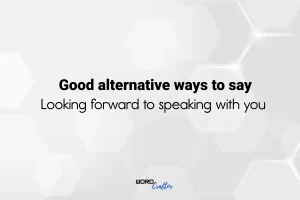
Good alternative ways to say “Looking forward to speaking with you”
- January 5, 2024
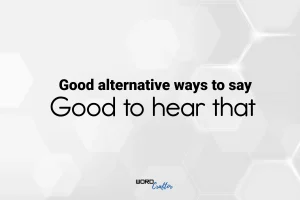
Good alternative ways to say “Good to hear that”
- January 2, 2024

Good alternative ways to say “You’re welcome”

Good alternative ways to say “That looks great”
Leave a reply cancel reply.
Your email address will not be published. Required fields are marked *
Name *
Email *
Add Comment *
Save my name, email, and website in this browser for the next time I comment.
Post Comment
- Cambridge Dictionary +Plus
Synonyms and antonyms of show in English

Word of the Day
Hippocratic oath
Your browser doesn't support HTML5 audio
a promise made by people when they become doctors to do everything possible to help their patients and to have high moral standards in their work

Sitting on the fence (Newspaper idioms)
Learn more with +Plus
- Recent and Recommended {{#preferredDictionaries}} {{name}} {{/preferredDictionaries}}
- Definitions Clear explanations of natural written and spoken English English Learner’s Dictionary Essential British English Essential American English
- Grammar and thesaurus Usage explanations of natural written and spoken English Grammar Thesaurus
- Pronunciation British and American pronunciations with audio English Pronunciation
- English–Chinese (Simplified) Chinese (Simplified)–English
- English–Chinese (Traditional) Chinese (Traditional)–English
- English–Dutch Dutch–English
- English–French French–English
- English–German German–English
- English–Indonesian Indonesian–English
- English–Italian Italian–English
- English–Japanese Japanese–English
- English–Norwegian Norwegian–English
- English–Polish Polish–English
- English–Portuguese Portuguese–English
- English–Spanish Spanish–English
- English–Swedish Swedish–English
- Dictionary +Plus Word Lists
Add ${headword} to one of your lists below, or create a new one.
{{message}}
Something went wrong.
There was a problem sending your report.
- Daily Crossword
- Word Puzzle
- Word Finder
- Word of the Day
- Synonym of the Day
- Word of the Year
- Language stories
- All featured
- Gender and sexuality
- All pop culture
- Grammar Coach ™
- Writing hub
- Grammar essentials
- Commonly confused
- All writing tips
- Pop culture
- Writing tips
Advertisement
noun as in demonstration, exhibition
Strongest matches
- presentation
Strong matches
- manifestation
- representation
noun as in entertainment event
- entertainment
- motion picture
noun as in false front; appearance given
- affectation
- make believe
- ostentation
- grandstand play
verb as in actively exhibit something
- demonstrate
Weak matches
verb as in passively exhibit something
- materialize
- make the scene
- put in appearance
- show one's face
verb as in grant
Strongest match
verb as in accompany
Discover More
Related words.
Words related to show are not direct synonyms, but are associated with the word show . Browse related words to learn more about word associations.
noun as in pretended behavior
- dissimilation
- false front
- performance
- shuck and jive
noun as in part of a performance
- introduction
verb as in affirm
verb as in publicize for the purpose of selling or causing one to want
- beat the drum for
- circularize
- communicate
- get on soapbox for
- make a pitch
- press agent
- put on the map
Viewing 5 / 282 related words
Example Sentences
Policemen on the show joke about prison riots, bomb threats, and the shooting of unarmed civilians.
As soon as this attack [happened], Paris citizens came together to show were are not afraid, we are Charlie Hebdo.
And they might not have to wait that long to show their political heft.
Not actual CIA agents, but U.S. government personnel who have worked very closely with the CIA, and who are fans of the show.
Earlier this week, Huckabee ended his Fox News talk show so he could spend time mulling another bid for the Republican nomination.
None other would dare to show herself unveiled to a stranger, and a white man at that.
I shall show how it is possible thus to prolong life to the term set by God.
Not only do children thus of themselves extend the scope of our commands, they show a disposition to make rules for themselves.
He called upon the Order to show their title-deeds, but was met with a contemptuous refusal.
If any one has lost his temper, as well as his money, he takes good care not to show it; to do so here would be indeed bad form.
When To Use
What are other ways to say show .
The noun show often indicates an external appearance that may or may not accord with actual facts: a show of modesty . Display applies to an intentionally conspicuous show: a great display of wealth . Ostentation is vain, ambitious, pretentious, or offensive display: tasteless and vulgar ostentation . Pomp suggests such a show of dignity and authority as characterizes a ceremony of state: The coronation was carried out with pomp and splendor .
Synonym of the day
Start each day with the Synonym of the Day in your inbox!
By clicking "Sign Up", you are accepting Dictionary.com Terms & Conditions and Privacy Policies.
On this page you'll find 525 synonyms, antonyms, and words related to show, such as: appearance, display, fair, pageant, parade, and presentation.
From Roget's 21st Century Thesaurus, Third Edition Copyright © 2013 by the Philip Lief Group.
Synonyms of essay
- as in article
- as in attempt
- as in to attempt
- More from M-W
- To save this word, you'll need to log in. Log In
Thesaurus Definition of essay
(Entry 1 of 2)
Synonyms & Similar Words
- dissertation
- composition
- prolegomenon
- undertaking
- trial and error
- experimentation
Thesaurus Definition of essay (Entry 2 of 2)
- have a go at
- try one's hand (at)
Antonyms & Near Antonyms
Synonym Chooser
How does the verb essay differ from other similar words?
Some common synonyms of essay are attempt , endeavor , strive , and try . While all these words mean "to make an effort to accomplish an end," essay implies difficulty but also suggests tentative trying or experimenting.
When might attempt be a better fit than essay ?
While the synonyms attempt and essay are close in meaning, attempt stresses the initiation or beginning of an effort.
Where would endeavor be a reasonable alternative to essay ?
Although the words endeavor and essay have much in common, endeavor heightens the implications of exertion and difficulty.
When is strive a more appropriate choice than essay ?
While in some cases nearly identical to essay , strive implies great exertion against great difficulty and specifically suggests persistent effort.
How do try and attempt relate to one another, in the sense of essay ?
Try is often close to attempt but may stress effort or experiment made in the hope of testing or proving something.
Articles Related to essay

To 'Essay' or 'Assay'?
You'll know the difference if you give it the old college essay
Thesaurus Entries Near essay
Cite this entry.
“Essay.” Merriam-Webster.com Thesaurus , Merriam-Webster, https://www.merriam-webster.com/thesaurus/essay. Accessed 30 Mar. 2024.
More from Merriam-Webster on essay
Nglish: Translation of essay for Spanish Speakers
Britannica English: Translation of essay for Arabic Speakers
Britannica.com: Encyclopedia article about essay
Subscribe to America's largest dictionary and get thousands more definitions and advanced search—ad free!

Can you solve 4 words at once?
Word of the day.
See Definitions and Examples »
Get Word of the Day daily email!
Popular in Grammar & Usage
The tangled history of 'it's' and 'its', more commonly misspelled words, commonly misspelled words, how to use em dashes (—), en dashes (–) , and hyphens (-), absent letters that are heard anyway, popular in wordplay, the words of the week - mar. 29, 9 superb owl words, 'gaslighting,' 'woke,' 'democracy,' and other top lookups, 10 words for lesser-known games and sports, your favorite band is in the dictionary, games & quizzes.

- Share full article
Advertisement
Supported by
Word of the day
Word of the Day: baffled
This word has appeared in 154 articles on NYTimes.com in the past year. Can you use it in a sentence?

By The Learning Network
baffled \ ˈbæfəld \ adjective and noun
adjective: perplexed by many conflicting situations or statements; filled with bewilderment noun: people who are frustrated and perplexed
Listen to the pronuciation.
The word baffled has appeared in 154 articles on NYTimes.com in the past year, including on Feb. 29 in “‘ Spaceman’ Review: What Happened Here ?” by Alissa Wilkinson:
When was the last time you looked at the exquisite list of synonyms for the word “ baffled ”? They may be among the best in the English language: puzzled, nonplused, discombobulated, flummoxed, stumped, fogged, wildered, buffaloed. They’re delicious, delightful, full of consonants, evocative of a very particular feeling: you’re presented with something that seems as though it should be clear, but you can’t make it make sense. The occasion for my bout of word nerdery is the Adam Sandler movie “Spaceman,” and for that I thank the film. It is not a particularly confusing movie on its own, in part because we’ve seen its likes before: a spaceman, alone in the inky blackness, goes a little nuts, and also gains clarity on his life back on earth. What’s flummoxing about “Spaceman” isn’t what it is, but why it is.
Daily Word Challenge
Can you correctly use the word baffled in a sentence?
Based on the definition and example provided, write a sentence using today’s Word of the Day and share it as a comment on this article. It is most important that your sentence makes sense and demonstrates that you understand the word’s definition, but we also encourage you to be creative and have fun.
If you want a better idea of how baffled can be used in a sentence, read these usage examples on Vocabulary.com . You can also visit this guide to learn how to use IPA symbols to show how different words are pronounced.
If you enjoy this daily challenge, try our vocabulary quizzes .
Students ages 13 and older in the United States and the United Kingdom, and 16 and older elsewhere, can comment. All comments are moderated by the Learning Network staff.
The Word of the Day is provided by Vocabulary.com . Learn more and see usage examples across a range of subjects in the Vocabulary.com Dictionary . See every Word of the Day in this column .

IMAGES
VIDEO
COMMENTS
KEY TAKEAWAYS. "This shows" is a common phrase used in essays to demonstrate how one thing leads to another. "This demonstrates" is a great formal synonym that'll help to spice up your academic writing. Try "suggesting" as an alternative that shows how one thing could have created another. Keep reading to learn different ways to ...
This implies we still have a lot of work to do before we can finalize anything. 6. Proving. "Proving" is a word you can use instead of "this shows" in an essay. It comes from "this proves," showing how something creates another situation. Proof is often the most important in scientific studies and arguments.
6. Implying. Next, we recommend writing "implying" instead of "this shows.". Again, this is a good one to use in the middle of a sentence. So, we recommend writing it when explaining how one situation leads to another in the same string of text. It's good in academic writing as it's quite professional and clear.
Embarking on the journey of expressive writing requires the adept use of language. Unveiling alternative phrases for "This Shows" can transform your essays into compelling narratives. In this article, we delve into 12 distinctive expressions,
This Confirms. Example: "The DNA test confirms the suspect's presence at the crime scene.". Meaning: "Confirm" is a stamp of validation, establishing the truth, accuracy, or correctness of something without a shadow of a doubt. Usage: In legal or scientific contexts, "confirm" is used when evidence solidly supports a claim or ...
For example, some synonyms may imply causation, while others might suggest correlation, providing subtle but important distinctions. The benefits of diversifying our language include improved reader engagement, ... Discussing historical events in an academic essay "This shows the impact of the war." ...
Synonyms for This Shows (other words and phrases for This Shows). Synonyms for This shows. 199 other terms for this shows- words and phrases with similar meaning. Lists. synonyms. antonyms. definitions. sentences. thesaurus. words. phrases. Parts of speech. adverbs. verbs. Tags. show. demonstrate. represent.
In an essay, when we use the phrase "This shows," we are basically pointing out that something in the essay clearly demonstrates or proves a point. It's like saying, "Look here, you can see an example or evidence of what I'm talking about." For example, imagine you're writing an essay about the benefits of exercise.
What's the definition of This shows in an essay in thesaurus? Most related words/phrases with sentence examples define This shows in an essay meaning and usage. ... Lists. synonyms. antonyms. definitions. sentences. thesaurus. Synonyms Similar meaning. it is demonstrated in an article. it is demonstrated in an essay. it is illustrated. it is ...
Phrases for This Shows In An Essay (alternative phrases for This Shows In An Essay). ... Lists. synonyms. antonyms. definitions. sentences. thesaurus. suggest new. it is demonstrated in an article. it is demonstrated in an essay. it is illustrated. it is illustrated in an article. it is shown in an article. it is shown in an essay.
"To Show" Synonyms 1. To demonstrate To demonstrate how this happened, a mini replica of the experiment was constructed.Allow us to demonstrate the purpose of each strategically placed apparatus. 2. To present To present the results as thoroughly as possible, two different programs were required.We used a chart to present the results. 3. To reveal To reveal why this happened, thousands and ...
Academic Contexts Explain. Demonstrate: The study demonstrates the impact of climate change on migration patterns.; Illustrate: Graphs in the report illustrate the statistical relationship between the variables.; Expound: The author expounds on the theory with ample evidence from recent research.; Elaborate. Explicate: The paper explicates the steps taken to ensure the integrity of the data.
Synonyms for SHOWS: displays, exhibits, unveils, flashes, announces, exposes, waves, produces; Antonyms of SHOWS: masks, disguises, covers, hides, conceals, obscures ...
Synonyms for SHOW: display, exhibit, unveil, flash, announce, expose, produce, parade; Antonyms of SHOW: disguise, mask, camouflage, hide, cover, conceal, curtain ...
Best expression synonyms for 'this shows in an essay' are 'it is demonstrated in an article', 'this is illustrated' and 'this is visible'.
SHOW - Synonyms, related words and examples | Cambridge English Thesaurus
Find 247 different ways to say show, along with antonyms, related words, and example sentences at Thesaurus.com.
Another way to say Shows? Synonyms for Shows (other words and phrases for Shows). Synonyms for Shows. 1 079 other terms for shows- words and phrases with similar meaning. Lists. synonyms. antonyms. definitions. sentences. thesaurus. words. phrases. Parts of speech. verbs. nouns. adjectives.
Looking for other ways to say for example after using it for the umpteenth time? No worries. Discover a wide variety of options to replace it here!
Synonyms for ESSAY: article, paper, dissertation, theme, thesis, composition, treatise, editorial; Antonyms of ESSAY: quit, drop, give up
Most related words/phrases with sentence examples define Show meaning and usage. Thesaurus for Show. Related terms for show- synonyms, antonyms and sentences with show. Lists. synonyms. antonyms. definitions. sentences. thesaurus. Parts of speech. verbs. nouns. adjectives. Synonyms Similar meaning. View all. demonstrate. indicate.
Best synonyms for 'this shows in an essay' are 'it is demonstrated in an article', 'this is illustrated' and 'this is visible'.
baffled \ ˈbæfəld \ adjective and noun. adjective: perplexed by many conflicting situations or statements; filled with bewilderment. noun: people who are frustrated and perplexed.
synonyms. 12 Synonyms. 8 Antonyms. 2 Broader. 98 Related. 1. » it is demonstrated in an article exp. 1. » this is illustrated exp.